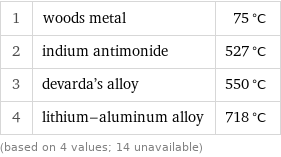Input interpretation

alloys | melting point
Summary

median | 538.5 °C highest | 718 °C (lithium-aluminum alloy) lowest | 75 °C (woods metal) distribution | | (based on 4 values; 14 unavailable)
Entities with missing values

sodium-potassium alloy | titanium-copper alloy | zirconium-nickel alloy (30:70) | zirconium-nickel alloy (70:30) | beryllium compound with titanium (12:1) | beryllium compound with vanadium (12:1) | copper-tin alloy | beryllium compound with niobium (12:1) | sodium-lead alloy | lanthanum nickel alloy | ... (total: 14)
Melting point rankings

1 | woods metal | 75 °C 2 | indium antimonide | 527 °C 3 | devarda's alloy | 550 °C 4 | lithium-aluminum alloy | 718 °C (based on 4 values; 14 unavailable)
Unit conversions for median melting point 538.5 °C

811.6 K (kelvins)

1001 °F (degrees Fahrenheit)

1461 °R (degrees Rankine)

430.8 °Ré (degrees Réaumur)

290.2 °Rø (degrees Rømer)
Comparison for median melting point 538.5 °C

(160 to 800) °C below typical temperature of magma (700 to 1300 °C)

56.28 °C above typical temperature of an electric oven during self-cleaning (900 °F)

211 °C above melting point of lead (327.46 °C)
Corresponding quantities

Thermodynamic energy E from E = kT: | 70 meV (millielectronvolts)

Blackbody energy flux Φ from Φ = σT^4: | 24609 W/m^2 (watts per square meter)

Approximate luminous exitance from a planar blackbody radiator perpendicular to its surface: | 0.038 lx (lux)